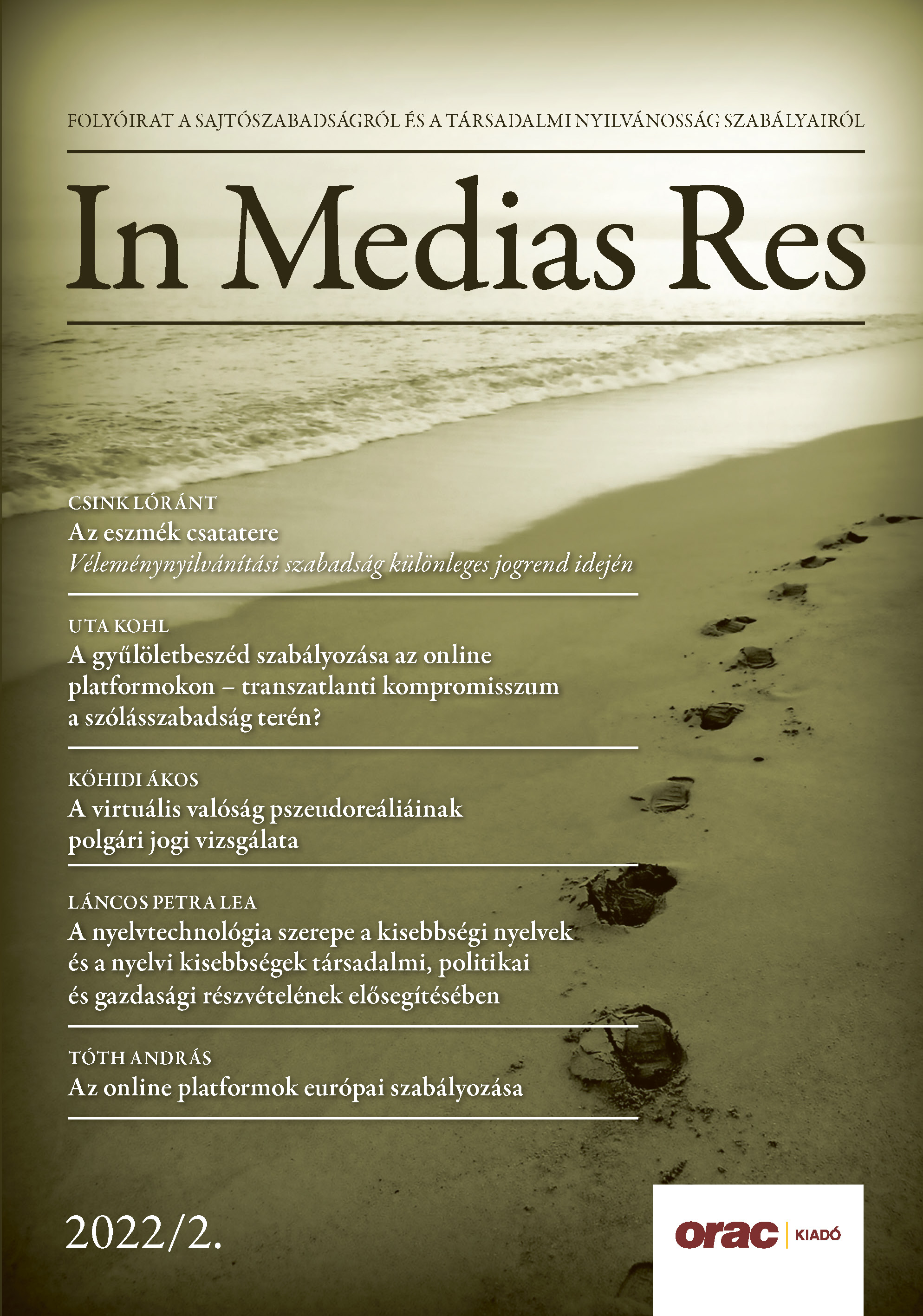A gyűlöletbeszéd szabályozása az online platformokon – transzatlanti kompromisszum a szólásszabadság terén?
DOI:
https://doi.org/10.59851/imr.11.2.3Kulcsszavak:
az amerikai alkotmány első kiegészítése, Digital Services Act, gyűlöletbeszéd, német hálózati végrehajtási törvény, platformok felelősségeAbsztrakt
A jelen tanulmányban amellett érvelek, hogy a gyűlöletbeszéd egyesült államokbeli és európai kezelésében mutatkozó bináris szembenállás olyan nem bináris aggályokat rejt, amelyek mögött eltérő skálán elhelyezkedő, eltérő elsődleges félelmek rejlenek. Az európai liberális demokráciák félelme arra irányul, hogy a gyűlöletbeszéd a nagy nyilvánosság előtt cenzúrázatlan marad (az aggály a beavatkozás „tárgyára” irányul), míg Amerika a tartalomba való állami beavatkozások következményeitől tart (az aggály a „beavatkozóra” vonatkozik). Ezt követően bemutatom, hogy az online gyűlöletbeszéd elleni 2017-es német törvény (NetzDG) – amely a jelentősebb platformokat arra kötelezi, hogy a felhasználói eltávolítási bejelentésekre válaszul moderálják a tartalmakat a német jogszabályok által előírt szólásszabadsági normák alapján – sikeresen áthidalja a szólásszabadság amerikai és európai hagyományai közötti szakadékot. Vitathatatlan, hogy a magánjogi eljárásokon keresztül érvényre juttatott állami normák mechanizmusa egyedülállóan képes arra, hogy egyszerre csendesítse le az európaiak elsődleges félelmét a nyilvános beszéd hatékony ellenőrzésének hiányától és az amerikaiak elsődleges félelmét az állami cenzúra jelenlététől.
Hivatkozások
András Koltay: The Private Censorship of Internet Gatekeepers. 59 University of Louisville Law Review (2021) 255., 264-től.
Anu Bradford: The Brussels Effect: How the European Union Rules the World. Oxford, Oxford University Press, 2020., https://doi.org/10.1093/oso/9780190088583.001.0001
C. Edwin Baker: Autonomy and Hate Speech. In Ivan Hare - James Weinstein (szerk.): Extreme Speech and Democracy. Oxford, Oxford University Press, 2009, 139., 140-től., https://doi.org/10.1093/acprof:oso/9780199548781.003.0009
Catharine A. MacKinnon: Only Words. Cambridge, Harvard University Press, 1993.
Christopher T. Marsden: Internet Co-Regulation: European Law, Regulatory Governance, and Legitimacy in Cyberspace. Cambridge, Cambridge University Press, 2011, 54., https://doi.org/10.1017/CBO9780511763410
David Beetham: The Legitimation of Power. Boston, Humanities, 1991., https://doi.org/10.1007/978-1-349-21599-7
Edward J. Eberle: Dignity and Liberty: Constitutional Visions in Germany and the United States. Westport, Praeger, 2002, 224.
Edward J. Eberle: The Architecture of First Amend Free Speech. Michigan State Law Review (2011) 1191., 1193.
Eric Barendt: Freedom of Expression. Oxford, Oxford University Press, 2005
Eric Heinze: Hate Speech and Democratic Citizenship. Oxford, Oxford University Press, 2016, https://doi.org/10.1093/acprof:oso/9780198759027.001.0001
Eric Heinze: Viewpoint Absolutism and Hate Speech. 69(4) Modern Law Review (2006) 543, https://doi.org/10.1111/j.1468-2230.2006.00599.x
Frederick Schauer: Free Speech: A Philosophical Enquiry. Cambridge, Cambridge University Press, 1982.
Frederick Schauer: The Exceptional First Amendment. The Exceptional First Amendment' Faculty Research Working Paper Series, Harvard University John F. Kennedy School of Government, 2005,, https://doi.org/10.2139/ssrn.668543
Hugo L. Black: The Bill of Rights. 35 New York University Law Review (1960) 865., 874.
Ivan Hare - James Weinstein (szerk.): Extreme Speech and Democracy. Oxford, Oxford University Press,
Jack Balkin: Free Speech in the Algorithmic Society: Big Data, Private Governance, and New School Speech Regulation. 51 University of California Davis Law Review (2018) 1149., https://doi.org/10.2139/ssrn.3038939
Jacob Rowbottom: To Rant, Vent and Converse: Protecting Low Level Digital Speech. 71 Cambridge Law Journal (2012) 355, https://doi.org/10.1017/S0008197312000529
James Q. Whitman: Enforcing Civility: Three Societies. 109 Yale Law Journal (2000) 127, https://doi.org/10.2307/797466
James Q. Whitman: The Two Western Cultures of Privacy: Dignity Versus Liberty. 113 Yale Law Journal (2004) 1151., 1219, https://doi.org/10.2307/4135723
James Weinstein: An Overview of American Free Speech Doctrine and its Application to Extreme Speech. In Ivan Hare - James Weinstein (szerk.): Extreme Speech and Democracy. Oxford, Oxford University Press, 2009., https://doi.org/10.1093/acprof:oso/9780199548781.003.0005
Jeremy Waldron: The Harm in Hate Speech. Cambridge, Harvard University Press, 2012, https://doi.org/10.4159/harvard.9780674065086
Julia Hörnle: Internet Jurisdiction in Law and Practice. Oxford, Oxford University Press, 2021., https://doi.org/10.1093/oso/9780198806929.001.0001
Kate Klonick: The New Governors: The People, Rules and Process Governing Online Speech. 131 Harvard Law Review (2018) 158.
Law Commission: Abusive and Offensive Online Communications: A Scoping Report (2018 Nov 1) Law Com No 381
Martin Eifert: Rechenschaftspflichten für soziale Netzwerke und Suchmaschinen. Neue Juristische Wochenschrift (2017) 1450., 1454.
Matthew P. Hooker: Censorship, Free Speech and Facebook: Applying the First Amendment via the Public Function Exception. 15(3) Washington Journal of Law, Technology & Arts (2019) 35.
Michael Herz - Péter Molnár (szerk.): The Content and Context of Hate Speech. Cambridge, Cambridge University Press, 2012
Michael Kang - Jacob Eisler: Trump's Challenge to Constitutional State Speech 2022
Molly K. Land: Against Privatized Censorship: Proposals for Responsible Delegation. 60 Virginia Journal of International Law (2020) 363., https://doi.org/10.2139/ssrn.3442184
Patrick Zurth: The German NetzDG as Role Model or Cautionary Tales? Implications for the Debate on Social Media Liability. 31 Fordham Intellectual Property, Media & Entertainment Law Journal (2021) 1084., https://doi.org/10.2139/ssrn.3668804
Seth Kreimer: Censorship by Proxy: The First Amendment, Internet Intermediaries, and the Problem of the Weakest Link. 155 University of Pennsylvania Law Review (2006) 11., https://doi.org/10.2307/40041302
Uta Kohl: Jurisdiction and the Internet: Regulatory Competence over Online Activities. Cambridge, Cambridge University Press, 2007, https://doi.org/10.1017/CBO9780511495311
Ute Frevert: The Politics of Humiliation: A Modern History. Oxford, Oxford University Press, 2020.
Vincent Blasi: The Pathological Perspective and the First Amendment. 85 Columbia Law Review (1985) 449., https://doi.org/10.2307/1122510
Megjelent
Hogyan kell idézni
Folyóirat szám
Rovat
License
Copyright (c) 2022 Uta Kohl

This work is licensed under a Creative Commons Attribution 4.0 International License.


